As an Amazon Associate I earn from qualifying purchases.
A well-tuned piano is crucial for the enjoyment of the instrument, it’s longevity and the development of the pianist. Pianos do go out of tune for various reasons, but unless you have perfect pitch it’s not always easy to know when that happens. However, there is an easy to tell if a piano is out of tune.
Here’s how to tell if a piano is out of tune. To tell if a piano is out of tune you should use a reliable digital tuner. Digital tuners like the Korg TM40 give accurate measurements when a pitch is played on the piano. A properly tuned piano will register a perfect balance between flat and sharp on a digital tuner dial.
There are several other ways to tell if a piano is out of tune which we’ll get into later in the article. Before this, let’s discuss what causes pianos to go out of tune and how you can extend the life of your tuning and save money in the process.
Want to Learn Piano?Click Here
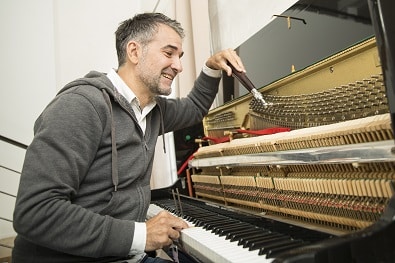
What Causes A Piano To Go Out Of Tune
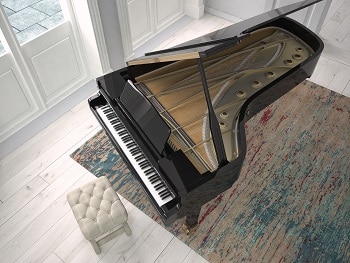
Pianos go out of tune for several reasons. Some of it is self-inflicted by the owner of the instrument, and other times it’s related to aspects out of your control. Below are the most common reasons pianos go out of tune.
Poor Humidity Control
Humidity has a tremendous effect on the condition of an acoustic piano. For most pianos to stay in tune for 6 months or more, the humidity levels need to be kept around 50% to 70%. The temperature needs to be at least 68 degrees.
Keeping your piano in this state not only helps with tuning, but it also helps to prevent the wood from swelling. If you have a piano next to a window then it may experience sudden fluctuations in temperature, especially during the hottest time of the day. This is why it’s always a good idea to place a piano on an inside wall.
Sometimes controlling the humidity in the home is out of your control, especially if you live in a southern climate like Florida. There are some unique ways to keep a piano constantly regulated when you’re not in the home.
This programmable dehumidifier is a great solution for piano owners. For example, it will automatically measure the moisture in the air and adjust it accordingly. The reservoir is 1.3 gallons, so it’s low maintenance. There are also built-in timers so you can combine this easily with a smart thermostat and even sync it up with a voice activated device like this one.
In general, I recommend dehumidifiers for those with expensive grand pianos as you want to keep the regulation and tuning intact as often as possible. There are also complete humidity regulation devices that can be installed to the bottom of grand pianos too although they are quite expensive.
Lack Of Consistent Tuning
Not having your piano tuned enough can lead to future tuning issues. The biggest issue will be that it will only go out of tune faster than it did before. Pianos need to be tuned at the very least once per year.
Some professionals even recommend tuning at least twice per year. If it’s been longer than a year since you’ve tuned your piano, expect it to go out of tune quicker than usual until it’s gotten used to a consistent tuning schedule.
Constant Use
Pianists who practice several hours per day already have an understanding of this next point. Anything regarding tuning or regulation is affected by how much the instrument is used. Yes, it’s possible to play the piano out of tune.
While piano tuners do their best to make their work on the instrument last for a considerable amount of time, sometimes the amount of use it gets will outweigh that work.
The average piano tuning only last around 6 months before it needs to be adjusted again. Newer pianos will often fluctuate with their tuning and need more frequent work initially. As pianos age, they tend to settle in and maintain it’s tune much better.
With that said, a simple way to prolong the tuning of the instrument is to use it a little less. The difference won’t be great, but it will add more months to the life of the tuning procedure the technician performed.
Age Of The Instrument
While pianos become more consistent with their tuning as they age, extremely old pianos tend to have more issues. With age comes the need to replace various parts like the strings, action mechanisms and much more.
All of those things can greatly affect the tuning of the instrument. This is why I always suggest those looking to buy a piano to go with a newer instrument if possible.
Newer pianos are easier to predict and ultimately will maintain a better tune than something antique. Read my piano buying guide here for more details.
Poor Tuning Work Performed
Have you ever had your piano tuned only to realize that it’s gone out of tune less than a month later? Chances are your piano technician did a poor job with the instrument.
Every now and then piano technicians will make mistakes, especially if they are not using a digital tuner in the process. Some take more old fashion approaches; using tuning forks and their well-trained ear to determine the tone of a piano.
With the advancement in technology though, it just makes sense to incorporate electronic devices into the procedure, even if it’s just to perform a final check.
The majority of reputable tuners charge a higher price for their tuning services. This is how much it costs to tune a piano on average. Most tuners who charge very low prices are not as reliable with their work.
Sometimes they cut corners in order to make the service more affordable, however as the pianist that’s not desirable. Once you’ve found a piano tuner that you trust, build a relationship with them and try to maintain them for all of your future tuning needs.
Why Digital Tuners Work Best For Piano Tuning Assessment
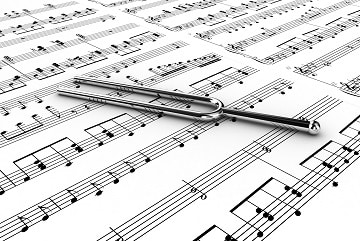
Digital tuners are basically computer-based devices. Computers don’t make mistakes when it comes to tuning, and this is why I feel they work best. There is no substitute however for a great human ear and in combination with digital tuners, excellent results can be achieved.
Most digital tuners have a variety of frequency settings available to them. This is helpful if you live in a different country other than the US that does not tune their instruments to 440Hz.
In addition to just listening to the pitch and reacting on the dial, digital tuners can also play pitches from the speakers installed on them as well. The versatility of these devices makes them really attractive tools to have in a piano technicians toolbox.
The other benefit of digital tuning acoustic instruments is that it best prepares the piano for ensemble playing. I’m not just referring to string instruments, but electronic instruments like guitars. Since most guitarists tune their instruments using digital tuners, they are often out of tune with acoustic pianos.
However, if a piano technician uses the digital tuner they would help limit the number of intonation issues between the instruments. If you’ve got some basic tuning tools on hand, you could bend the pitch upward or downward before a live performance using a digital tuner too.
Other Ways To Tell If Your Piano Is Out Of Tune
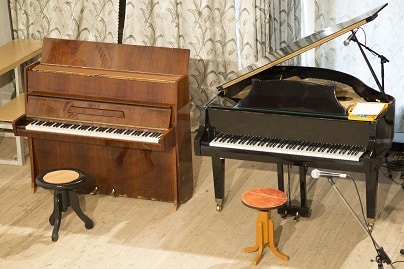
There are other ways to tell if a piano is out of tune. One way I like to use is the interval test.
Testing The Intervals
I start off on middle C and I play up a third to E broken. Then I play that same chord blocked. If I don’t hear a wobble in the sound I’ll do the same procedure heading up to F to make a fourth and G to make a fifth.
The further apart the interval, the more of a wobble in the pitches I’ll hear. If there is too much of vibration there, then I know one of those pitches is starting to lose the tune.
The same exercise can be done in the reverse. It’s a good idea to split the piano into three different segments; the bass area, treble area, and high area for this exercise.
Also, make sure not to leave octaves out of the equation. When testing octaves listen to see if they end up meshing into one another. It’s a good idea to press the damper pedal and play three or four octaves. Listen carefully to see if one or more of those pitches sounds out of place compared to the others.
Listening For A Wavering Tone
A wobbling or wavering tone is a clear sign that the piano is out of tune. For this test you won’t need to play several notes at a time; only one. Start from middle C and play the key. Now ask yourself the following questions:
- Is the tone rich?
- Is the sound wavering?
- Does the pitch go sharp or flat after playing?
If all of those tests are passed then you can move on to the next key. For example, if you were to play D next and compared it to the richness of C and found issues then your piano may be out of tune.
It’s important that when you do this particular test that you do not compare the middle of the piano on equal footing with the treble or bass areas. Again, split the piano into three or four sections and compare all of the notes within that frequency range.
Testing Against Another Instrument
Another way to tell if a piano is out of tune is to tune another instrument with a digital tuner and then play along with it. If you have another piano in the home, then you can easily test both instruments side by side.
Play a passage of some of the music you’re working on in addition to playing individual notes. Other options are to play along with a recording of music to see if the intonation is not there.
Ways To Prevent Your Piano From Going Out Of Tune
Now that we know what can cause a piano to go out of tune, and why a piano needs to be tuned, it’s time to figure out a way to prevent that from happening.
The first thing you should do is make sure the instrument is not located near any windows. Placing the piano on an inside wall, and a room where temperatures don’t get out of control is absolutely crucial.
With the piano in a proper location, it’s time to develop a consistent schedule for temperatures in the home. Monitor the weather and make sure that the piano stays in that 68 Degrees Fahrenheit range for best results. If possible, I would invest in a smart thermostat for the individual room the piano is located in.
Smart thermostats like the Nest T3007ES allows you to set up heating and cooling schedules. It can be installed in any room, it’s touch controlled, and it can be adjusted from a smartphone even if you’re not at home.
How To Find A Good Piano Tuner
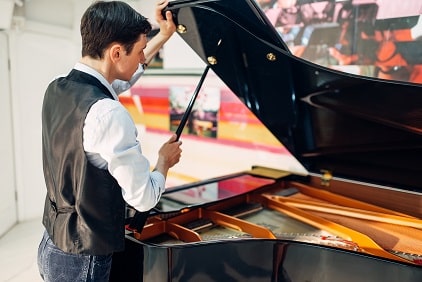
Locating a good piano tuner takes practice. The first place you can start is with a simple Google search of piano tuners in your zip code. From here you can use a service like Angie’s List, or just browse through websites and reading reviews that people have left.
Another way to find a tuner is to reach out to the local piano dealerships in the area. The often have a database of piano technicians that they can refer you to including their own in house technicians. I’ve found that in house tuners can be quite expensive to use, so exercise caution when using that option.
The last, but probably the most reliable way to find a great tuner is to just ask around. Reach out to others in the community and find out who they use to tune their instruments.
It’s also a good idea to reach out to local concert pianists, performing arts centers and music organizations to get great information. Ultimately, don’t cheap out on a piano tuner, it can come back to bite you!
Related Questions
Can I tune a piano myself? Yes. Tuning a piano yourself is quite simple as long as you have the right gear. A simple tuning kit like this one will provide you with everything you need to get started. It would be wise to add in a digital tuner to this set to help double check your work. There are also several YouTube videos available to help guide you along the way.
Should You Tune Your Piano? Just because you have the ability to tune your piano does not mean you should. Piano technicians have years and thousands of hours of experience tuning and regulating instruments. Tuning yourself can lead to serious damage that will cost more money in the long run. It’s best to leave it up to the professionals. If you plan to tune your instrument, consider doing minimal work.
How long after moving a piano should it be tuned? For those who have just bought a new piano, it’s very tempting to tune it right away. The piano, however, needs to adjust to the climate of its new home. It’s recommended to wait at last two weeks to a month before scheduling the first tuning procedure. This will help it maintain it’s initial tuning for much longer as it continues to adjust.
Hello & thanks for stopping by! I’m a professional concert pianist and piano instructor. In the United States, I’ve given successful performances in several places including New York, Florida, Connecticut, & New Jersey, I have also performed internationally in Italy and made my Carnegie Hall debut in 2014. I enjoy blogging about the piano, the art of performance, general music, current events and the latest in music production.
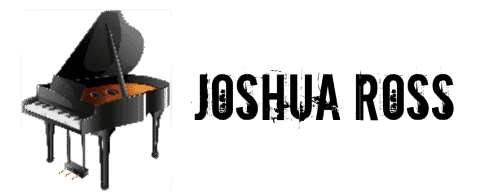
Sariah Meagle
Wednesday 13th of March 2019
Yesterday, I was playing my piano when I noticed that it was grossly out of tune when I used a digital tuner to test if it was still working. I think it's now out of tune due to my constant use. When you mentioned that the age of the instrument could also be a factor as to why it was so, I'll hire a skilled repairman to ensure that it doesn't get harmed in the process.
Why Does A Piano Need To Be Tuned - Joshua Ross
Thursday 17th of January 2019
[…] The main benefit of piano tuning is to get it sounding pleasant to the ear. Most pianos drop in pitch over time, leading to a flat sound that wobbles when a key is played. Here’s how to tell if a piano has lost its tune. […]